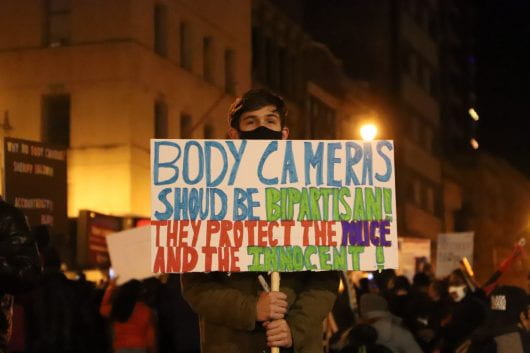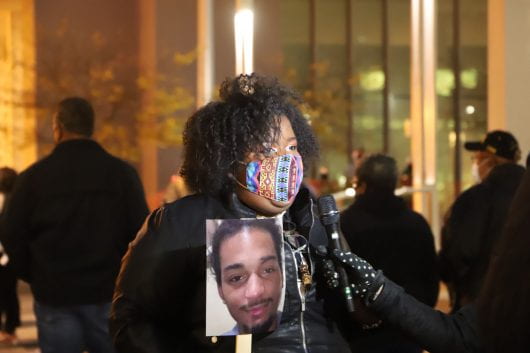
Demonstrators marched through streets in downtown Columbus Friday in response to the Dec. 4 killing of Casey Goodson by a Franklin County sheriff’s deputy. Credit: Mackenzie Shanklin | Photo Editor
Sarah Szilagy, Jack Long, Mackenzie Shanklin, Owen Milnes, Max Garrison and Sam Raudins contributed reporting.
More than 300 people gathered in downtown Columbus to protest the death of Casey Goodson Jr. Friday night after he was shot multiple times by a Franklin County Sheriff’s deputy Dec. 4.
Goodson, a 23-year-old Black man from Columbus, was killed after being shot multiple times in the torso outside of his home in northeast Columbus by Franklin County Sheriff’s Deputy Jason Meade Dec. 4, Franklin County Coroner Dr. Anahi Ortiz said Wednesday. Meade is not currently on duty, and is under investigation by federal and local authorities.
At a Thursday press conference, Goodson’s family said Goodson was walking home from a dentist’s appointment carrying a Subway sandwich when he was killed outside the house.
Meade’s attorney said Goodson pointed a handgun at Meade. A handgun was recovered from the scene, according to Columbus Police, but Goodson’s family said he had a concealed carry permit and that waving a gun around was out of character for Goodson.

Jason Meade, the Franklin County Sheriff’s Deputy who shot Goodson, was not wearing a body camera when he shot Goodson. Credit: Mackenzie Shanklin | Photo Editor
Meade was not wearing a body camera because Franklin County Sheriff’s task force officers are not issued body cameras, according to a Dec. 9 Columbus Police statement.
Kiara Yakita, 31, organized the protest.
“[We are] coming together, uniting across multiple organizations to take a united stand for Casey Goodman Jr., this young beautiful ambitious intelligent loyal proud inspirational loving empathetic 23-year-old boy was taken from us recklessly and disgustingly,” Yakita said. “At this point, no one can deny there is a problem. The chief of police, as much as he likes to, can no longer deny there is a problem. We are here to tell them not one more name. Not one more.”
About 100 protestors gathered at the Franklin County Government Center a little before 6 p.m.. They began with a prayer and address from U.S. House Representative for Ohio’s Third District Joyce Beatty.
“No matter what our differences have been, tonight has to be the end. We can’t talk about what we didn’t do, what we should have done, because we all could have done more. But what we do know is Casey’s name should be the last name,” Beatty said.
By 6:30 p.m., the crowd had grown to more than 300 people and marched through the streets of downtown before reconvening at the Ohio Statehouse.
This is not the first time Columbus has seen protests following the killings of Black people by law enforcement. Over the summer, thousands took to the streets for weeks following the killings of George Floyd and Breonna Taylor.
Ohio State students were among the crowd, including Ohio State men’s basketball player Seth Towns. Towns was detained May 29 during protests in the wake of Floyd’s death. Shayanna Hinkle-Moore, a second-year in public affairs and city and regional planning, said the Floyd protests showed what the city of Columbus is capable of.

Kiara Yakita, one of the organizers of the protest and founder of the Columbus Black Liberation Movement stands holding a photo of Casey Goodson. Credit: Mackenzie Shanklin | Photo Editor
“This is our city, Columbus came strong for the Geroge Floyd protests,” Hinkle-Moore said. “People should be out here today.”
Andrew Pierce II, a second-year in policy analysis and a member of the Columbus Chief Advisory Council, an advisory panel designed to allow members of the community to have input in police operations created in June, said this era and area are inclined to address deep-rooted issues such as systemic racism and police brutality.
“Our generation, as a community, we’re very good at protesting and addressing an issue, and calling voices in bringing spotlight to voices,” Pierce said.
Another protest is scheduled Saturday at noon at the Ohio Statehouse.
Correction: A previous version of this story misspelled Kiara Yakita’s name. The story has been updated with the correct spelling.


